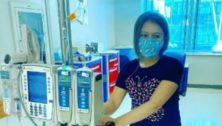Doylestown Health: Giving Patients a Voice or Finding One for Them

Who is the most important person in a patient’s wellness journey? Who is his or her most devoted advocate? Is it immediate family? The healthcare team? Some other advisor?
It turns out, according to Doylestown Health, it’s the patient him- or herself.
Having an engaged, informed recipient of healthcare services increases outcomes and patient satisfaction. Getting there is a matter of following a few pieces of practical advice:
- Write out questions before a visit, and ensure the doctor answers them. And don’t hesitate to take notes when answers are given. Some suggested queries include:
- What is my health issue?
- What do I need to do?
- Why do I need to do it?
- Ask your doctor for printed materials if you would like more information.
- Research your health conditions. Use credible sources that include:
- The Centers for Disease Control and Prevention
- National Institutes of Health
- Condition-specific groups like the American Cancer Society, American Lung Association, and the American Diabetes Association
- Keep a current health history. Bring it with you to doctor visits or to the hospital.
- Have an up-to-date list of your medicines on hand to give to your healthcare provider.
- Understand your legal Patient Rights and Responsibilities before being admitted to a hospital.
- Prepare an Advance Directive. This legal document states your healthcare treatment and care choices in case there is a time you are not able to make your wishes known. It usually names the people you choose to make healthcare decisions on your behalf if you are unable.
- Designate a family member or friend as a support person. This person can be your advocate — not just if you are incapacitated, but also to help you absorb information and help you make healthcare decisions. It is a good idea for this person to have access to your Advance Directive, health history, and medicine list.
- Be aware of your copay and deductible.
How to Advocate for a Loved One
Patient advocates help friends or family members manage their healthcare.
A conversation between advocates and loved ones can establish from the onset the level of involvement. Advocates may be involved in all or just a portion of care and the decisions surrounding it.
They may accompany patients to visits, access medical records as authorized, and be listed as a recognized contact for updates.
Advocates should have access to patients’ Advanced Directives, especially the knowledge of its specific location, should it need to be produced.
Within the download of info from patients to their advocates, a list of current medicines and a full medical history are important details.
Patient advocates can also take on the role of group communicator, providing families as a whole — rather than piecemeal — with status updates.
Communications among patients, health care professionals, and families can further be facilitated if the health care advocate:
- Lets the care team know that he or she has been asked by the patient to be the support person.
- Helps the team get to know the patient, alerting staff of issues like:
- Presence of dementia or other cognitive issues
- Hearing or vision issues or language barriers
- Preferred nicknames
- Makes sure the care team has his or her contact information.
- Informs the care team about windows of availability for visits. This will be helpful if the healthcare professionals need to teach the advocate any safety or care measures such as wound care, medicine, or physical therapy exercises.
- Asks for an ideal time and number to phone about a routine status check.
- Reaches out to the hospital’s advocate for further assistance over and above that being provided hy the care team and case manager.
Advocacy Services at Doylestown Hospital
Doylestown Hospital promotes informed decision-making and education for all patients. Its professionals seek to empower families and to let them know that they have the right to information and a right to be able to speak to the care team.
Doylestown Hospital’s advocacy efforts includes the work of the following professionals:
- Case Managers. A Case Manager is assigned to every patient. Doylestown Hospital Case Managers coordinate with home care, skilled nursing facilities, and other community resources as needed to ensure that patients have a care plan after discharge.
- Hospital Patient Advocates. The in-house patient advocates help with immediate problem-solving that exceeds a case manager’s role. They solve communication issues with the care team or if a patient or caregiver feels that he or she is not getting necessary health information. Doylestown Hospital Patient Advocates provide education and resources, empower families to problem-solve for themselves, and will help interpret Patient’s Rights, as needed.
- Patient and Family Education Coordinators. These coordinators drive the patient experience at the hospital through education. They lead health literacy efforts and ensure that patient education materials are clear and easy to understand. They also educate the staff to promote good patient-provider communication.
- The Patient Family Advisory Council. This group of community members and hospital staff is launching a new initiative for patient-centered care and advocacy. Its goal is to provide support to those navigating healthcare for themselves or on behalf of another.
More information on how Doylestown Health supports those who advocate for loved ones under care is online.
Connect With Your Community
Subscribe for stories that matter!
"*" indicates required fields





























